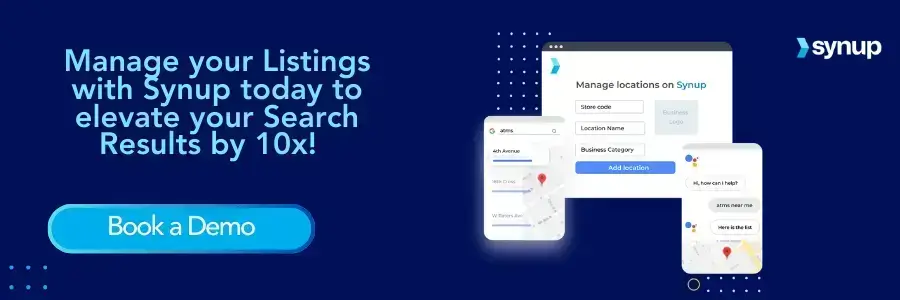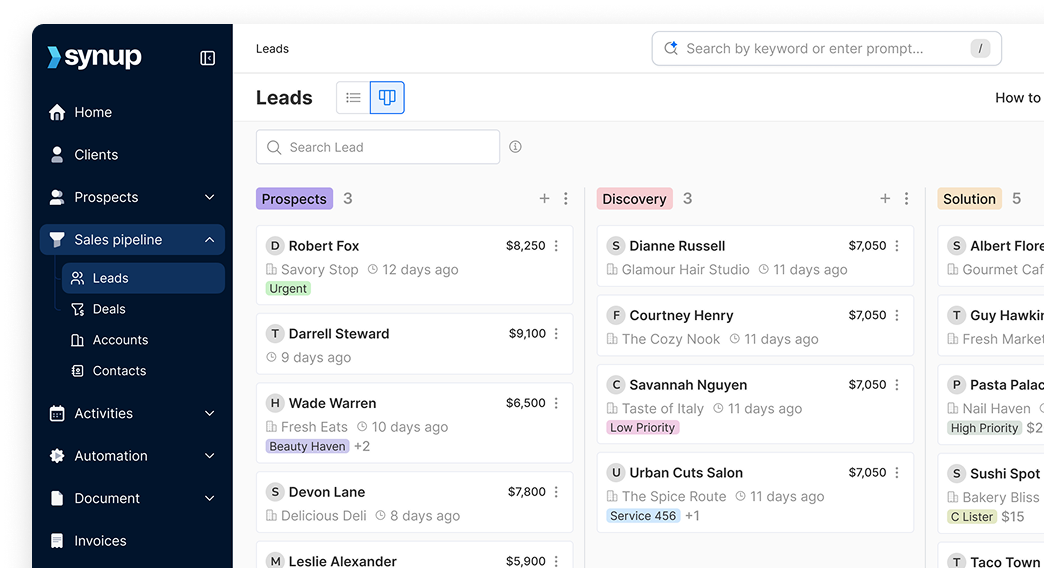How Centralized Local Listing Management Helps Multi-Location Businesses
Local listing management for multi-location businesses can be messy. Learn how a centralized local listing management system can help your business chain.

Local listing management across multiple platforms can be both time-consuming and frustrating. One minute, you're fixing store hours on Google, and the next, you're chasing down a rogue typo on Yelp. Then there's a nasty review that just dropped on another listing—time for damage control!
For businesses with multiple locations, this chaos multiplies even faster. Keeping track of each listing’s details can feel like an uphill battle. However, with the right tools and approach, you can centralize your local listing management to save time and reduce costly errors and inaccuracies. A centralized system allows you to sync updates effortlessly, maintain consistency across all platforms, improve your local SEO, and ultimately attract more customers from your local community.
This article will delve into the complexities of listing management for multi-location businesses and explore the numerous benefits of adopting a centralized management system. Let's get started on how to streamline your processes and enhance your business's online presence!
Complexity of Managing Listings Across Multiple Locations
Managing listings across multiple locations can feel very complex. It's tough to keep everything in sync. On the other hand, listing management for single-location businesses is easier, whether you're going manual or automated. It’s a whole new ballgame when you’re playing in multiple fields. Here are some strong reasons why it can become so complicated.
Data Consistency
Let's say one of your locations changes its hours, but somehow, the old info still shows up on Google. For a single-location business, this is a simple fix. You update the hours in each of the listings or use an automated tool to sync with the rest, and that's it. Done!

But for a multi-location business listing, you’ve got to update multiple places all at once. Any slip-up can confuse customers and make you look unreliable.
Localization
Imagine you’ve got a pizza chain with locations in New York, Miami, and Los Angeles. Each city has its own offers based on local needs. New Yorkers love their large single slices; Miami folks might want a Cuban twist.
A single-location business just focuses on its backyard. But with multiple spots, you have to localize your listings. Tailor the menu, update store details, and add relevant keywords based on the city. It’s like having to speak the local language for every location you visit.
SEO Challenges
What Local SEO means for a single-location business is, you’re just trying to rank in one place. But with multiple locations, each location needs its own search keywords to rank locally.
Plus, you’ve got to avoid competing with yourself. Have you heard of keyword cannibalization? It’s when your own locations start stealing traffic from each other. That never ends well. Your content simply erodes each other's chances of ranking well on the search engines.
But with the right strategy (and maybe some good listing management software), you can boost each location’s visibility without stepping on your own toes.
Performance Tracking

For a single-location business, tracking performance is a walk in the park. You’ve only got one location’s numbers to review. How many clicks, visits, or calls are you getting? Attend the reviews. And that's it.
But a multi-location business listing management is a full-on data circus. You have to keep tabs on how each spot is doing. It looks like sales in Chicago are up. But New York’s falling behind. Performance tracking for multiple spots is like watching the stock market for each city you're in. Without centralized local listing management, you’ll go crazy trying to keep up with who's winning and who’s losing, what's working and what needs a tweak.
Multi-Location Review Management
A single-location business gets a few reviews a week. But if you’ve got 10 or more locations, that’s a tidal wave of reviews coming in.
And we’re not just talking about Google. There's Yelp, Facebook, and anywhere else people feel like dropping their opinions on your product or service. With many business listings, you respond to one, and three more come up.
Compliance with Local Regulations
Unlike with single location business listings where there is one set of local rules to follow, the game changes when you’re operating in multiple cities or even states.
What’s totally fine in California might get you fined in Texas. Local labor laws, zoning regulations, or even how you display business hours online could vary.
Resource Allocation
When you have just one store, you just need one person or team to manage that listing. But for multi-location businesses, you need to divvy up resources smartly.
Do you hire separate teams for each location, or keep things lean with one team handling it all? It’s like deciding whether to have multiple chefs at each restaurant or a central kitchen sending out meals. And it’s not just people. Budget, tools, time—everything needs to be balanced.
Benefits of Centralized Local Listing Management
Running a multi-location business is already a lot of work. When you add the task of keeping all your listings accurate across platforms, it becomes a serious challenge. However, centralized local listing management can make this a whole lot easier in several ways.
Maintains Business Info Consistency
It often happens. One of your stores has changed its phone number. But you forget to update it on Yelp. Now, half your customers are calling a dead line, and you're wondering why business is slow.
However, with centralized local listing management, you can update that info in one listing and sync it across all platforms in one swoop. Google, Yelp, and Facebook — all done. No more hunting down every listing manually.
Consistency is huge for customer trust. If your business hours are different on Google than on your website, customers might just give up and head to your next-door competitor.
This consistency is a big deal for local SEO. Search engines love consistent and reliable information, so keeping things squeaky clean boosts your rankings and makes you easier to find.
Local Content at Scale
It's already agreed that every location is unique, right? Forget the branding; your location in Brooklyn is naturally going to feel different from the one in Seattle. Centralized listing management software lets you easily customize content for each location.
You can highlight a local special or promote an event unique to that area while still keeping your brand consistent. It’s more like having the same outfit but accessorizing it based on where you’re going: beachy in Miami, urban cool in Brooklyn.
By managing all this from one place, you ensure each location stays connected to its local community without losing sight of the bigger brand picture. That’s the beauty of a multi-location business listing.

Automated Listing Sync
A centralized local listing management system leaves you with no worries about outdated information due to the synchronization of updates across listings. If one store changes its hours, the whole network gets updated in real-time.
Think about this: You just opened a new location in Denver. Now, you’ve got to update Google, Yelp, Facebook, and who knows how many other platforms with the new info. Without automated syncing, it’s like running around town with a stack of flyers, hoping to reach the right people.
With Synup’s centralized local listing management, you enter your new location’s details once, and it syncs automatically across all platforms. Google knows. Yelp knows. Even that random app someone’s cousin made for restaurant reviews knows.
This also gives a major boost to Local SEO. After all, according to Search Engine Land, search engines love fresh, accurate info. And with everything consistently up-to-date, your multi-location business listing is more likely to rank higher in local searches. So, you’re not only saving time, you’re winning at the visibility game too.
Centralized Reporting and Analytics
Tracking performance across multiple locations is a mountain of work. One store’s doing well, another is struggling—but why? You’ve got data scattered everywhere. It’s chaos.
With centralized local listing management, all your reporting and analytics are in one place. You can see which locations are performing well and which ones need auditing, all without chasing down numbers from different platforms.
With centralized analytics, you can spot the gap, tweak your local SEO strategy, and watch traffic bounce back. And it doesn’t stop there. Centralized reporting helps you see which promotions are working, track customer reviews, and even manage inventory trends across locations.
Review and Reputation Management
Managing reviews for one location is a job in itself. But running multiple locations is like juggling a million balls. One bad review in Phoenix, a glowing one in San Diego, and three more waiting for a response. That's overwhelming.
However, having your local listing management in one place means you can easily track reviews across all locations. No more bouncing between Yelp, Google, and Facebook trying to keep up. You see all the feedback in one dashboard and reply quickly (or with Synup, let the built-in generative AI do that) while keeping your reputation spotless.
Improves Local SEO
Local SEO is all the tweaks you do to get found online by the local audience around your business location. For a multi-location business listing, you need to make sure each spot ranks in its own city without competing with your other locations.
You can optimize each listing for its unique area. Adjust the content for one location, tweak keywords for another, and add location-specific details like store hours or local events. This makes your listings more relevant to local customers and boosts your rankings in local searches. You're standing out, not just showing up.
When search engines see consistent, up-to-date information across all your listings, they give you extra brownie points. That means better visibility, more traffic, and more customers coming through your doors.
Multi-Location Changes and Updates
With Synup's centralized local listing management, all your changes get done in one fell swoop. Send your update once in a listing and sync things everywhere—Google, Yelp, Facebook, you name it. Do you have a new promotion running across your stores? Push it out from your Google Business Profile, and every location is in the loop. It’s like sending one text instead of individually messaging 20 people. It saves you time, sanity, and a bout of headaches.
To start managing your multiple-location listings with Synup, book a demo now.
Summing Up
Managing multiple locations is a never-ending stream of work. If you manage a chain of businesses with dozens of locations, manual listing management is a nearly impossible option. Otherwise, you wouldn't be doing it right. It doesn't matter how many staff members you put at the backend. With listings to claim and postcards to send for verification, or reviews to catch up with, there’s a lot to juggle. Plus, all handlers need to ensure consistent and accurate information updates.
However, centralized local listing management simplifies everything—from syncing platform updates to managing reviews and tracking performance. It keeps your listings accurate and helps you rank better locally.
Your listing management should be smarter, not harder. The Synup listing management software makes managing all your locations a breeze.

How Centralized Local Listing Management Helps Multi-Location Businesses: FAQs
What is centralized local listing management, and how does it help my business?
A centralized local listing management is a system that lets you manage all your business listings from one dashboard—Google, Yelp, Bing, you name it. So, whether you’re changing holiday hours, adding an update, or fixing a typo, you can do it in one swoop and let the system sync to the rest of your listings. It saves time and keeps your info consistent across the web, which is key for SEO.
How does a central local listing management improve local SEO?
The key is consistency. Search engines (like Google) reward businesses that give fresh updates regularly and keep their information consistent everywhere. When your name, address, and phone number (the famous NAP) match across all platforms, search engines are more likely to trust you and show your locations higher in search results. Plus, managing reviews and updating photos all from one place boosts your engagement, which search engines love.
Can I manage reviews for multiple locations through a centralized system?
Absolutely. With a centralized system, you can monitor and respond to reviews from all locations in one place, either in person or with the help of built-in automation features. Whether it’s a five-star rave or a complaint about cold coffee, quick, empathetic responses keep your customers happy and build trust in your brand.
What happens if I don’t use centralized local listing management?
Without it, things can get messy. Outdated info could frustrate customers. Plus, inconsistent listings could hurt your SEO—leading to lost visibility. It can hurt your revenue and reputation significantly.




